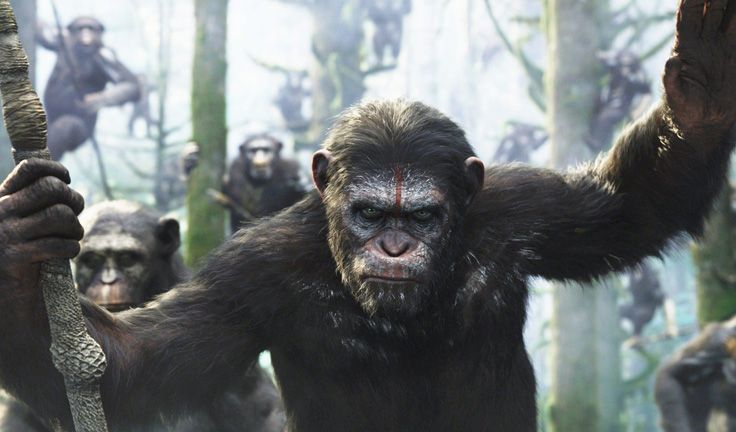
Dawn of the Planet of the Apes (2014) / Sci Fi-Action
MPAA Rated: PG-13 for intense sequences of sci-fi violence and action, and brief strong language
Running Time: 130 min.Cast: Andy Serkis, Jason Clarke, Keri Russell, Gary Oldman, Toby Kebbell, Kodi Smit-McPhee, Kirk Acevedo, Nick Thurston, Terry Notary, Karin Konoval, Judy Greer
Director: Matt Reeves
Screenplay: Rick Jaffa, Amanda Silver, Mark Bomback
Review published July 12, 2014
 There are occasionally those movies where I
grow a bit anxious when sitting to review, primarily because I realize that my
enjoyment of them might come across as overpraise, where if I just
knocked it down a half a star, I'd be able to state what I like about
it with a positive review and leave my opinion less open to
counter-criticism.
Avatar is one of those films (though it
did get a nomination for Best Picture), Mission:
Impossible III is another (though J.J. Abrams would go on to
become a highly touted action director), and the remake of
RoboCop earlier this year (which,
coincidentally, also featured a nuanced small role for Gary Oldman),
while admitting it can't hold a candle to the
Verhoeven original, is one of those films I will stick my critical
neck out to rave about.
There are occasionally those movies where I
grow a bit anxious when sitting to review, primarily because I realize that my
enjoyment of them might come across as overpraise, where if I just
knocked it down a half a star, I'd be able to state what I like about
it with a positive review and leave my opinion less open to
counter-criticism.
Avatar is one of those films (though it
did get a nomination for Best Picture), Mission:
Impossible III is another (though J.J. Abrams would go on to
become a highly touted action director), and the remake of
RoboCop earlier this year (which,
coincidentally, also featured a nuanced small role for Gary Oldman),
while admitting it can't hold a candle to the
Verhoeven original, is one of those films I will stick my critical
neck out to rave about.